Nurses' mental health: 'Most people in the NHS, they are sad'
- Published
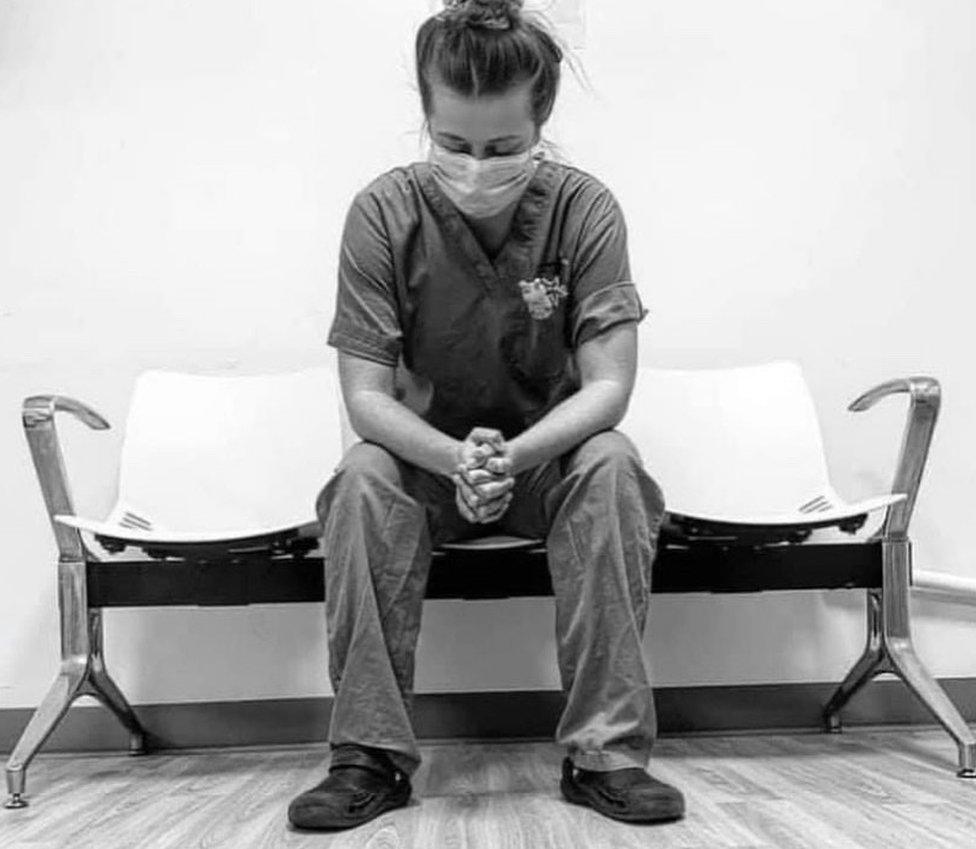
Emily Moorhouse is one of thousands of NHS staff who have either left the profession or changed roles in 2021
"NHS staff have run off adrenalin for the past year and that adrenalin is running out. We're all coming to the point where we're all just crashing and burning out."
Emily Moorhouse is one of thousands of NHS staff who have either left the profession or changed roles this year.
Although the Nursing and Midwifery (NMC) register shows the number of nurses, midwives and nursing associates has grown by 1.8% to just under 745,000, it also shows the number of people leaving the profession is at its highest rate since 2017 with 13,945 quitting between April and September this year.
The NMC and NHS England do not collate data on staff leaving departments so it is not easy to establish how many have left intensive care units or A&E during the pandemic.
An A&E nurse for four years, Emily has now moved to community nursing.
"I just knew that my mental health mattered more," she said.
"Sometimes you feel like you have to push on for the sake of your colleagues. It's not even like people are making you feel like that, it's just inside of you because you work as a team and you don't want to feel like you're letting your team down because you know it's going to make the situation worse if you're not there.
"It's really hard because part of you feels so guilty because you know it's only going to make it worse by you leaving. But in the same breath obviously they will employ new people and you do have to put yourself first."
She said it felt like staff and management were not being supported.
"It's all sort of just crumbling a little bit. That's what it feels like. It feels like it's collapsing. That's the best way I can describe it."
In January, Emily decided to take a three-month break.
"Afterwards, I didn't want to go back to A&E but I felt like I had something to prove to myself. Even if I was to go back and eventually move on to somewhere else - which I have done - I just felt like I needed to overcome that fear of being there again."
'I can't do this'
On her return, during an extremely busy shift, Emily realised she could not return full time to A&E.
"We were obviously understaffed - the whole NHS is understaffed at the minute which makes you sad, it really makes you sad, and you just want to help everybody in the safest way possible and you just feel like you're fighting a losing battle sometimes.
"You're trying your best but nothing's moving and you just feel like in a constant circle.
"It got to the point, I was on a night shift and I just cried. I just sat and I cried and I said 'I can't do this'. In my head I said this is why I'm leaving, because my mental health cannot take this any more."
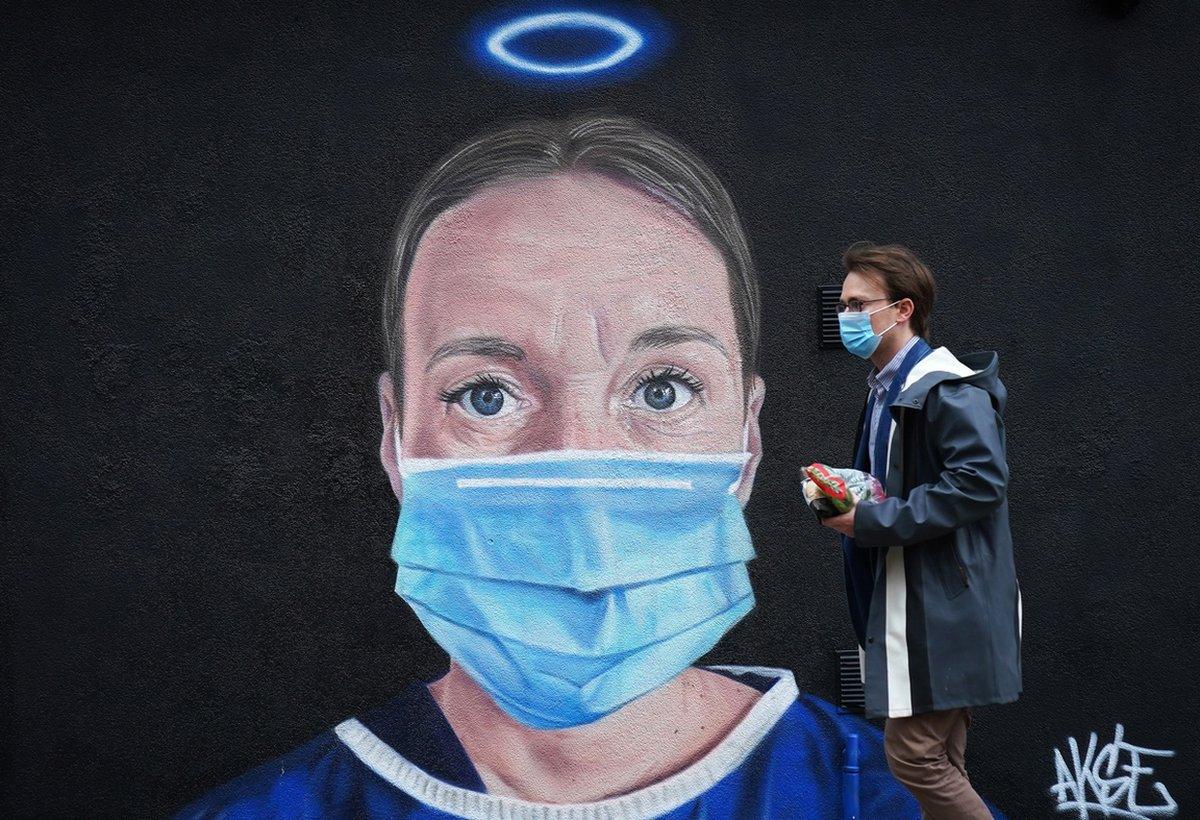
Murals of NHS workers have been painted throughout the pandemic - but now staff say they are facing abuse while at work
The pressure Emily felt built during the pandemic.
"It felt like the whole world was on our shoulders. It really did feel like that.
"Witnessing people obviously really, really sick with Covid and them asking if they'd be able to see their families again and you not being able to give them an answer, that in itself was heart-breaking. It affects your mental health massively because you're the first person they're speaking to.
"PPE (personal protective equipment) had a massive affect on me because whenever I feel anxious, I focus on my breathing but when you've got masks on your face and a gown on as well, you're really hot, you feel claustrophobic, so I found that didn't help.
"I couldn't properly function any more, I was at breaking point.
"I was not able to enjoy life in general because my mind was so overloaded with everything that I couldn't fit anything else in there.
"In some ways you were giving your all at work - and you do give your all at work - you come home and you'd have nothing left for your family. I'd come home and I wouldn't even want to talk. I was just fed up of talking.
"At home after shifts I'd be lying in bed with palpitations. I'd be shaking, sweating - just all your classic anxiety, panic attack symptoms. That's when I realised I needed to stop. I needed to take care of myself and recover from what we've witnessed over the past year."
During her career break, Emily realised just how much her mental health had deteriorated.
"While I was off work I had depersonalisation badly to the point where I disassociated from myself. I'd look in the mirror and I didn't feel like it was me looking back or when I was talking it didn't feel like it was me talking. I suffered with that really, really badly."
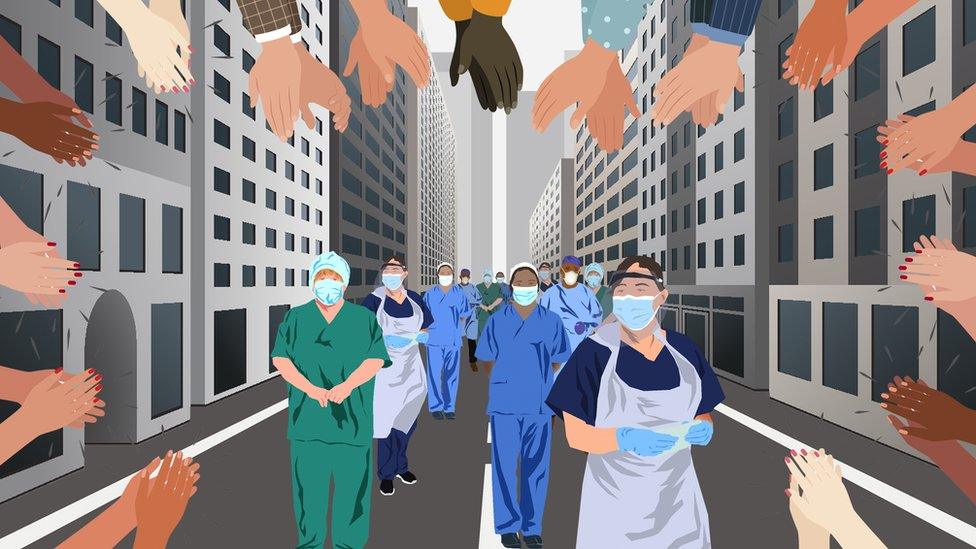
Clap for Carers filled Emily with a sense of pride
During her break, Emily told a counsellor from Frontline 19, a group of psychiatrists who offer free counselling to those who work on the care frontline, that she could not feel like this any more.
"She told me quite bluntly, 'Emily, stop. Stop trying to make it go away. Stop trying to push it away and stop trying to make it your enemy. It's your friend. It's there to help you. It's trying to protect you and keep you safe.'
"That really clicked something in my head because for so long I'd been trying to get rid of this feeling and push it away and once I realised it was only there to protect me, and it was sort of a wall in place to stop the bad things from getting in, that's when it started to fade away. That really, really stuck with me.
"It's a really strange feeling and unless you've been through it and felt it yourself, it's really hard to understand.
"It makes you feel like you're not even alive, it's a really, really bizarre feeling. And when she said that to me I could feel myself coming back. It's quite bizarre but I could feel like my thoughts coming back into my head instead of them being pushed aside."
Allow YouTube content?
This article contains content provided by Google YouTube. We ask for your permission before anything is loaded, as they may be using cookies and other technologies. You may want to read Google’s cookie policy, external and privacy policy, external before accepting. To view this content choose ‘accept and continue’.
Emily worked hard during her break to recover.
"I did a lot of exercise, I was up every morning running. I wasn't off slobbing around feeling sorry for myself, put it that way. I was doing everything in my powers to get right again. I tried everything: I tried hypnotherapy, I tried chakra balancing - everything you can think of I tried - I think the combination of everything and that self-help really did help me."
On her first day back following the break, Emily described having palpitations and feeling panicky.
"I felt that depersonalisation again and I knew it was just my fear setting in and I knew to be kind to it. Once I had practised being kind to myself, the anxiety slowly started to just drift into the background."
'Gave me goose bumps'
One thing which really helped was Hopeline19, external, a phoneline which NHS and frontline workers can call to listen to voice messages of support from people they help as well as colleagues.
"It's just incredible. It is just so good. I listened to one of the notes that had been uploaded when I was on a nightshift and it gave me goose bumps. It really did. And it makes you feel so worthy.
"I think because we've been made to feel so worthless recently, the Hopeline is just what nurses and doctors need at the moment. We need that uplift from the public. We need the public to be behind us because it helps massively. It helps keeps our spirits up."
The first time Emily used Hopeline19 was during a night shift in A&E.
"It was when I was having a really tough shift and I just thought: 'I need a pick me up, I need something to help me get through this,' and it did, it really did.
"The messages just keep rolling one after the other for as long as you need them for. There's a good mixture of messages on there from people saying how grateful they are for the service we give.
"It's exactly the same feeling as Clap for Carers. I remember being ready to go on to a night shift and being on my doorstep and everyone clapping and it fills you with a sense of pride and that you're doing something good.
"You know people are thinking about you but to have Hopeline19, it really does fill you with that encouragement and that worth and that will to go on a little bit more.
"Staff - nurses, doctors, healthcare assistants, paramedics - most people in the NHS, they are sad, a little bit broken and it really just helps to pick you up again and make you realise what you're doing it for.
"There are times throughout your career where you feel like you're losing yourself a little bit and you need that reminder of why you're doing this and that's what Hopeline19 does, it just reminds you of who you're doing it for."

Andrea Sutcliffe, chief executive and registrar at the NMC, said although nurses and midwives did all they could to care for people, they were exhausted from coping with the impact of the pandemic.
"We all need to work together to tackle the physical and mental pressure the pandemic is bringing to bear on the professions. If we don't, I'm afraid we may see more nursing and midwifery professionals leave the register in the future."
The NHS said it had created 40 mental health hubs to help staff recover and that hospitals were being encouraged to recruit more healthcare and medical support workers to ease the burden on existing staff.
Related topics
- Published13 January 2021
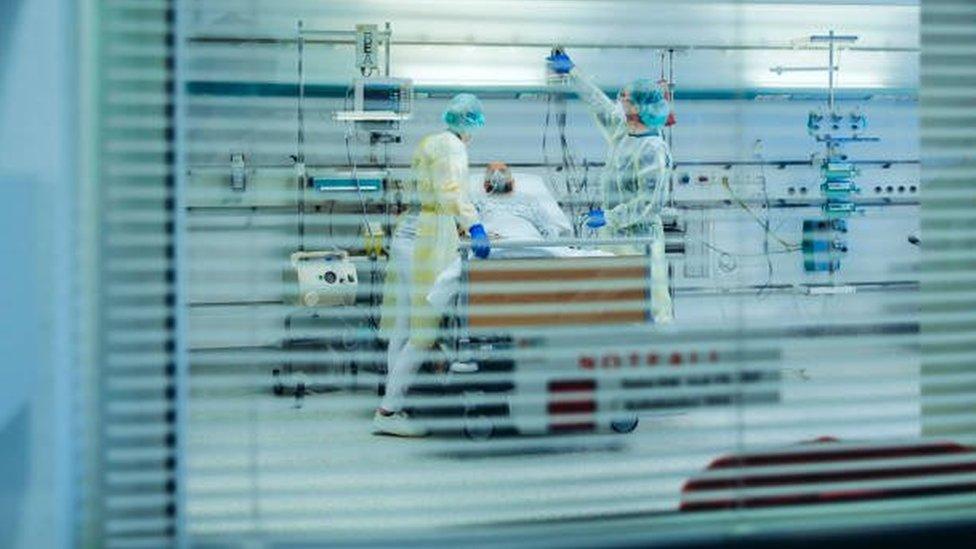
- Published15 January 2021
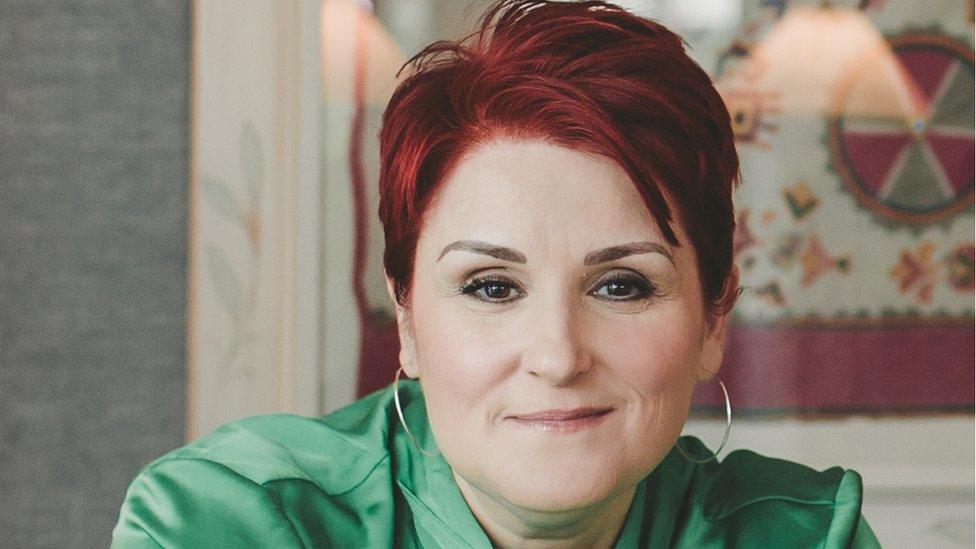
- Published28 October 2021